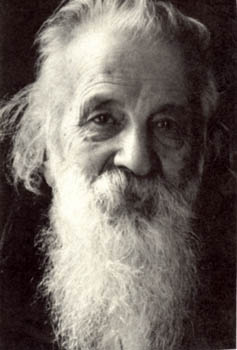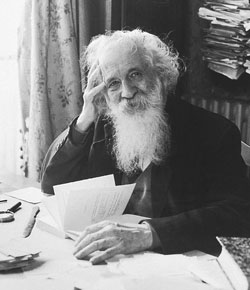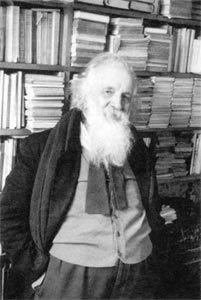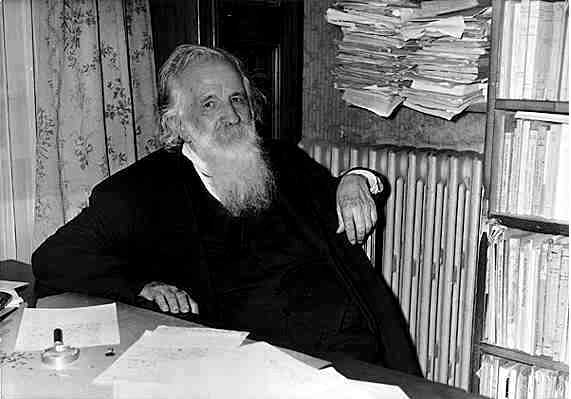<Back to Index>
- Philosopher Gaston Bachelard, 1884
- Writer Ivan Minchov Vazov, 1850
- King of Hungary Ladislaus I, 1040
PAGE SPONSOR



Gaston Bachelard (June 27, 1884, Bar-sur-Aube – October 16, 1962, Paris) was a French philosopher. He made contributions in the fields of poetics and the philosophy of science. To the latter he introduced the concepts of epistemological obstacle and epistemological break (obstacle épistémologique et rupture épistémologique). He rose to some of the most prestigious positions in the Académie française and influenced many subsequent French philosophers, among them Michel Foucault, Louis Althusser, Dominique Lecourt and Jacques Derrida.
Bachelard was a postmaster in Bar-sur-Aube, and then studied physics before finally becoming interested in philosophy. He was a professor at Dijon from 1930 to 1940 and then became the inaugural chair in history and philosophy of the sciences at the Sorbonne.
Bachelard's studies of the history and philosophy of science in such works as Le nouvel esprit scientifique ("The New Scientific Mind", 1934) and La formation de l'esprit scientifique ("The Formation of the Scientific Mind", 1938) were based on his vision of historical epistemology as a kind of psychoanalysis of the scientific mind, or rather of the psychological factors in the development of sciences. For instance, he takes the example of Heisenberg's first chapters of the Physical principles of the quantum theory, where he alternatively defends a corpuscular theory and an undulatory theory, correcting each by the others (The New Scientific Mind, IV). This, claims Bachelard, is an excellent example of the importance of psychological training in sciences, as one should correct spontaneous defaults by taking the opposite stance.
In the English speaking world, the connection Bachelard made between psychology and
the history of science has been little understood. Bachelard
demonstrated how the progress of science could be blocked by certain
types of mental patterns, creating the concept of obstacle épistémologique ("epistemological
obstacle"). One task of epistemology is to make clear the mental
patterns at use in science, in order to help scientists overcome the
obstacles to knowledge. Bachelard was critical of Auguste Comte's positivism, which considered science as a continual progress. To Bachelard, scientific developments such as Einstein's theory of relativity demonstrated the discontinuous nature of the history of sciences. Thus models that framed scientific development as continuous, such as that of Comte and Émile Meyerson,
seemed simplistic and erroneous to Bachelard. Through his concept of
"epistemological break", Bachelard underlined the discontinuity at work
in the history of sciences. However the term "epistemological break"
itself is almost never used by Bachelard, but became famous through Louis Althusser. He
showed that new theories integrated old theories in new paradigms,
changing the sense of concepts (for instance, the concept of mass, used by Newton and Einstein in two different senses). Thus, non-Euclidean geometry did not contradict Euclidean geometry, but integrated it into a larger framework. Bachelard was a rationalist in the Cartesian sense, although he recommended his "non-Cartesian epistemology" as a replacement for the more standard Cartesian epistemology. He
compared "scientific knowledge" to ordinary knowledge in the way we
deal with it, and saw error as only illusion: "Scientifically, we think
the truth as the historical rectification of a long error, and we think
experience as the rectification of the common and original illusion (illusion première). The role of epistemology is
to show the history of the (scientific) production of concepts; those
concepts are not just theoretical propositions: they are simultaneously
abstract and concrete, pervading technical and pedagogical activity. This explains why "The electric bulb is an object of scientific thought… an example of an abstract - concrete object." To
understand the way it works, one has to pass by the detour of
scientific knowledge. Epistemology is thus not a general philosophy
that aims at justifying scientific reasoning. Instead it produces
regional histories of science. Bachelard
saw how seemingly irrational theories often simply represented a
drastic shift in scientific perspective. For instance, he claimed that
the theory of probabilities was just another way of complexifying reality through a deepening of rationality (even though critics like Lord Kelvin found this theory irrational). One of his main theses in The New Scientific Mind was that modern sciences had replaced the classical ontology of the substance with an "ontology of relations", which could be assimilated to something as a Process philosophy.
For instance, the physical concepts of matter and rays correspond,
according to him, to the metaphysical concepts of the thing and of
movement; but whereas classical philosophy considered both as distinct,
and the thing as ontologically real, modern science can not distinguish
matter from rays: it is thus impossible to examine an immobile thing,
which was precisely the conditions of knowledge according to classical theory of knowledge (Becoming being impossible to be known, in accordance with Aristotle and Plato's theories of knowledge). In non-Cartesian epistemology, there is no "simple substance" as in Cartesianism, but only complex objects built by theories and experiments, and continuously improved. Intuition is therefore not primitive, but built. These themes led Bachelard to support a sort of constructivist epistemology.
In
addition to epistemology, Bachelard's work deals with many other
topics, including poetry, dreams, psychoanalysis, and the imagination. The Psychoanalysis of Fire (1938) and The Poetics of Space (1958) are among the most popular of his works. Thomas S. Kuhn used Bachelard's notion of "epistemological rupture" (coupure or rupture épistémologique) as re-interpreted by Alexandre Koyré to develop his theory of paradigm shifts; Althusser, Georges Canguilhem (his successor at the Sorbonne) and Michel Foucault also drew upon Bachelard's epistemology. Bachelard's daughter, Suzanne, translated Husserl's Formale und transzendentale Logik in French.
